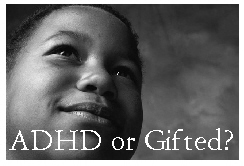 Gifted and creative children often have difficulty in the public school system. Their behaviors can mimic ADHD (Attention-Deficit Hyperactivity Disorder) and they can sometimes be labeled as problem children, daydreamers, or even slow learners. Instead of getting the special educational opportunities that they need and deserve, they are incorrectly classified and improperly held back from achieving their full potential. When gifted children have their talents properly channeled and find an appropriate setting for education, they can make contributions to society which can transform the world.
Gifted and creative children often have difficulty in the public school system. Their behaviors can mimic ADHD (Attention-Deficit Hyperactivity Disorder) and they can sometimes be labeled as problem children, daydreamers, or even slow learners. Instead of getting the special educational opportunities that they need and deserve, they are incorrectly classified and improperly held back from achieving their full potential. When gifted children have their talents properly channeled and find an appropriate setting for education, they can make contributions to society which can transform the world.
A New Perspective
Just think…perhaps your child is not just hyperactive, restless, and reactionary, but is in reality bored and unchallenged. Perhaps your son’s mind wanders because he is visionary and imaginative. Perhaps your daughter’s refusals in class are due to the fact that she sees things in new, intuitive ways. Are you going to medicate this child, accept the diagnosis of ADHD blindly, and force your child to be average?
Searching for Answers
Now this is a new perspective for me. I’ve been doing a great deal of research on the subject of ADHD lately, and the impact of medication on these kids. I’ll have some blogs coming soon with the information I find. But having three children who’ve been diagnosed with ADHD, two of whom are currently on medication, I find myself in a state of turmoil over the matter. I have witnessed a complete transformation in my two step-daughters, who prior to being on medication were teetering on the brink of academic disaster and now are happy, successful, and making friends. My son who was diagnosed with ADHD has not needed medication and is a gifted child. He is a straight A student, articulate, and extremely intuitive for his age. Where is the boundary, I wonder, between Attention Deficit Hyperactivity Disorder and a gifted, creative child? I believe it’s a blurry line indeed.
Here are some of the characteristics of ADHD children, which, when looked at in a new light, could be considered aspects of a gifted child’s nature:
ADHD Problem Behavior: The child is restless and has nervous energy in class.
Gifted Child: The child is eager, alert, and frustrated that the class isn’t moving at her pace. She wants to create and DO something.
ADHD Problem Behavior: The child daydreams and is distracted in class.
Gifted Child: He is imagining things, and his mind is flowing with creative ideas that are not being utilized.
ADHD Problem Behavior: The child withdraws from participation with the rest of the class, and seems sullen and unhappy.
Gifted Child: She is a high achiever who is afraid of failure and error. Rather than be wrong or have her unusual ideas misunderstood, she closes herself off from the group.
ADHD Problem Behavior: The child refuses to follow instructions and doesn’t do classwork in the prescribed way.
Gifted Child: He is intuitive and comes up with answers without having to do the remedial work. He sees certain school tasks as useless and has his own ideas of how things should work. He’s independent and inventive.
ADHD Problem Behavior: The child won’t participate in team sports or games and is uncooperative.
Gifted Child: She is aesthetically oriented and is still thinking about the artwork she wants to finish or the story she wants to write.
ADHD problem behavior: The child is sloppy and disorganized.
Gifted child: He is full of creative, abstract ideas without being concerned about order or organization. He is theoretical.
In a future blog I will discuss educational opportunities and strategies for gifted children. For now, I would recommend that parents always keep an open mind with regard to their son or daughter’s diagnosis. Search for your child’s unique gifts and talents, and don’t insist that he or she be ordinary. Seek the appropriate education fit. ADHD? Maybe. But perhaps your child has intuitive gifts that could change the world. What will you do to uncover the truth?
Kristyn Crow is the author of this blog. Visit her website by clicking here. Some links on this blog may have been generated by outside sources are not necessarily endorsed by Kristyn Crow.
Related Articles: The Animal School: A Fable for Parents

